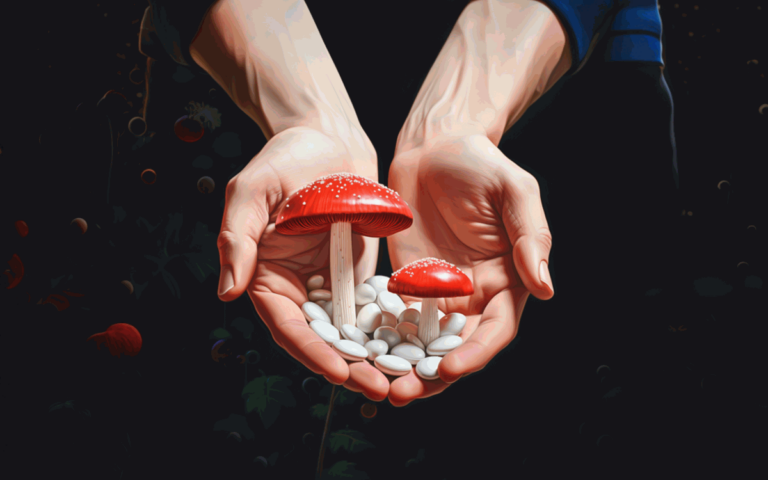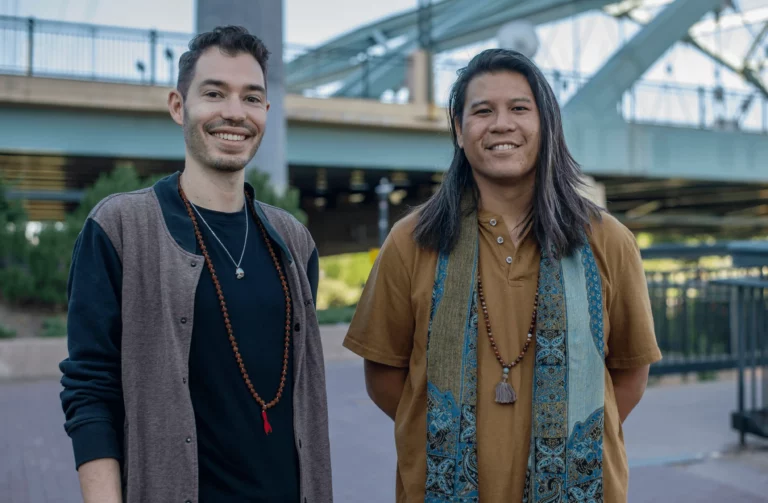From ego-death to extrasensory perception to aliens, the field of transpersonal psychology has encompassed some of the most interesting and controversial scientific explorations of modern history.
This field seeks to balance the materialistic lens of modern psychology with the ancient, alternative, and mystical elements found throughout nearly every ancient and indigenous culture in the world.
Essentially, transpersonal psychology gives space to spiritual and mystical experiences within the scientific framework of modern day psychology, and it isn’t hard to see how this intersects with psychedelic research.
The 20th century saw a resurgence of interest in psychedelics around the same time that this new field of psychology emerged—in the 1960s to be exact—as researchers and counterculture figures explored altered states of consciousness.
While mainstream psychology and psychiatry may study the therapeutic benefits of psychedelics on mental health conditions like PTSD, anxiety, and depression, transpersonal psychology incorporates the idea of “spiritual emergency.”
In this article, we will discuss this fascinating field of research, the relevancy of psychedelic exploration, how psychedelics played a role in the development of transpersonal psychology, and what it means to be a multidimensional being.
What is Transpersonal Psychology?
Transpersonal (spiritual or para) psychology, is a subfield of psychology which explores spiritual and transcendent dimensions of the human experience, going beyond the traditional focus on the individual and material aspects of the mind.
Emerging in the 1960s, this field delves into the profound questions about the nature of consciousness, the human psyche, and the interconnectedness of all beings.
All this it does while seeking to integrate spirituality, personal growth, and the exploration of higher states of consciousness within the realm of scientific inquiry.

At its core, transpersonal psychology acknowledges that human experiences extend beyond the individual ego and encompass collective and even transcendent realms.
It embraces the belief that individuals are more than their physical bodies and personal identities while emphasizing the potential for personal transformation, self-discovery, and spiritual development.
It seeks to uncover the deepest aspects of human consciousness, including mystical experiences, altered states of awareness, and the connection to something greater than the self.
One of the foundational principles of transpersonal psychology is the idea of interconnectedness or unity consciousness. This perspective posits that all living beings are interconnected, and there is an underlying unity that binds everything together.
This interconnectedness forms the basis of compassion, empathy, and a sense of responsibility towards the well-being of others and the planet.
Other key concepts within this framework include extra-sensory perception, peak experiences, and altered states of awareness, all combined with the more traditional aspects of modern psychology.
This field draws inspiration from the Enlightenment era, Eastern religions, and ancient and indigenous traditions from all over the world, offering a global and inclusive perspective on spirituality and ideology.
“Almost all indigenous cultures who have used psychedelics for hundreds perhaps thousands of years report that as one’s consciousness expands beyond the perimeters of the identity, that there are other beings, other realms of existence which are met, often across cultures with identical descriptions.” —James Fadiman
Ideals like the Perennial Philosophy—which emphasizes the common underlying truths found in various spiritual traditions and mystical experiences—play a key role.
This perspective suggests that mystical encounters provide a direct experience of the divine and can be a transformative force in a person’s life.
Transpersonal psychology also explores the role of meditation, mindfulness practices, and contemplative traditions in fostering states of expanded awareness and connection to the transcendent.
The field of transpersonal psychology overall has “a strong focus on the mind-body connection, spiritual transcendence, personal values, and purpose” as well as “connection to a larger sense of existence; recognition of what’s sacred; and drive to find a greater sense of being” (PsychCentral, 2022).
Important Figures of the Transpersonal Psychology movement:
- Abraham Maslow—known for his role in the evolution of humanistic psychology and his concepts: “the hierarchy of needs” and “peak experiences”
- Anthony Sutich—a key figure in the founding of the Transpersonal psychology movement, known for his fascination with mystical experiences and creating a subset of humanistic psychology which encompasses transcendental, spiritual experiences
- Stanislav Grof—a co-founder of the Institute of Transpersonal Psychology, known for his research into altered states of consciousness, psychedelics, and his practice “holotropic breathwork”
- James Fadiman—a co-founder of the Institute of Transpersonal Psychology and known for his experimentation with microdosing psychedelics
- William James—played a formative role in the development of transpersonal psychology, helping define the “mystical experience” by attributing it four distinct qualities (passivity, ineffability, noetic, transient) and through his experimentations with psychoactive substances—namely nitrous oxide
- Carl Jung—played a formative role in the development of transpersonal psychology with his concepts of “collective unconscious” and “archetypes,” veering away from traditional psychologists like Freudian psychoanalysis
The Role of Psychedelics in Transpersonal Exploration
Psychedelics play a significant role in transpersonal psychology as they often initiate or invoke mystical, transcendent, emotional, or spiritual experiences.
Many of the early thought-leaders and founders of the movement experimented with psychoactive substances like LSD, psilocybin, and nitrous oxide.
The recent resurgence of interest, not only for therapeutic purposes but also for self-exploration and the expansion of human consciousness, opens doors to explore multiple dimensions of the human experience beyond the personal realm.
Psychedelic substances, such as psilocybin mushrooms, ayahuasca, peyote, and LSD, have been utilized for centuries by indigenous cultures worldwide for sacred rituals, healing, and spiritual exploration.
These cultures recognized the potential of these substances to induce altered states of consciousness that fostered profound experiences of unity, interconnectedness, and transcendent insights.
Shamans and spiritual leaders in these cultures have used psychedelics to connect with the divine, gain spiritual wisdom, and facilitate healing of physical and psychological ailments.
The ceremonial use of these substances allows individuals to transcend the limitations of the individual self and access higher realms of consciousness.

Scientific research, on the other hand, has shown promising results, with psychedelic-assisted therapy demonstrating significant benefits for patients, including reduced symptoms and improved well-being.
The findings suggest that psychedelics in the brain temporarily alter brain connectivity, changing activity in the default mode network which is associated with self-referential (egoic) and mundane thinking.
Moreover, research has demonstrated time and time again that psychedelics induce genuine mystical experiences characterized by feelings of unity, sacredness, and transcendence.
These mystical experiences are often associated with long-term positive changes in an individual’s life, including increased well-being, enhanced life satisfaction, and decreased fear of death.
There is also a strong link between psychedelic use and heightened empathy and emotional connectivity. This heightened empathic capacity can contribute to more profound interpersonal connections and greater social harmony.
Transpersonal experiences induced by psychedelics have the potential to drive individuals towards pro-social behaviors and environmental consciousness.
The dissolution of ego boundaries can lead to a greater sense of interconnectedness with the environment and a desire to protect and preserve it for future generations.
Here are some articles we’ve previously written on spiritual and transpersonal benefits of using psychedelics intentionally:
- Psychedelics and mindfulness
- Psychedelics and self-actualization
- Psychedelics, Personality, and Spirituality
- Psychedelics for Transcendental Healing
- Psychedelics and Creativity
- Psychedelics and Paranormal/Mystical Experiences
- Psychedelics and Intimate Relationships
Exploring the Multi-Dimensional Human Experience
Interestingly, both psychedelics and transpersonal psychology have come to be associated with counterculture and alternative subcultures like the new age movement.
This is likely due to the underlying belief that certain elements of the self, reality, and the universe are intangible, immaterial, and undefined (or unobservable) through modern scientific methods.
These beliefs are often upheld by those who have experienced psychedelics as powerful transcendent agents of transformation or view transpersonal psychology as a more inclusive avenue for research.
In new age communities specifically, scientific proof is not needed and is even believed to have extreme limits in what it can and cannot evaluate about the human condition.
In light of this belief, those who helped found the field of transpersonal psychology even helped “spiritual emergency” become a diagnostic classification in the DSM-IV.
Furthermore, both transpersonal psychology and psychedelics offer a balanced approach between the materialistic, reductionist lens of traditional science and the unobservable dimensions of human experience.
With a strong focus on the mind-body connection, spiritual transcendence, personal values, and purpose, transpersonal psychology advocates treating individuals as multidimensional and holistic beings.
While some new age communities may not require scientific proof for their beliefs, the field of transpersonal psychology values empirical research and exploration of the human psyche’s deeper realms.
Healing and processing through this lens occur through creative, experiential, introspective, and expressive strategies such as art, music, journaling, relaxation techniques, dream analysis, meditation, and self-reflection.
Psychedelics play a crucial role in this exploration, inducing altered states and opening doors to profound insights as well as emotional expression and catharsis.
Through psychedelics, alterations in perception and time allow for a unique vantage point at which one can reflect on existential fears and concepts, finding a deeper sense of peace, resolution, and purpose.
Download Our Free Psilocybin Sourcing Guide
For harm-reduction purposes, we provide links to online psilocybin vendors, local stores, delivery services, and spore vendors for growing your own medicine at home.
Ego dissolution is another transformative aspect of transpersonal exploration. Psychedelics have been shown to temporarily dissolve the boundaries of the ego, allowing individuals to experience a state of egolessness or “ego-death.”
This dissolution can be both challenging and liberating, leading to a profound sense of unity and interconnectedness with all of existence.
Lastly, research has demonstrated the efficacy of psychedelic-assisted therapy in providing breakthroughs for individuals facing treatment-resistant mental health conditions.
Under the guidance of a professional, psychedelics can safely help individuals gain new perspectives, access repressed memories, and release emotional blockages.
The altered states induced by psychedelics create an opportunity for deep introspection and self-exploration, which can lead to lasting psychological healing.
Transpersonal experiences, whether induced by psychedelics or other means, can be instrumental in processing trauma and emotional challenges.
In the safety of a therapeutic setting, transpersonal experiences can offer healing and resolution for deeply entrenched emotional issues or simply facilitate deep personal expansion.
Enhance Your Psychedelic Journey With Personalized Guidance
Here at Psychedelic Passage, it is our mission to provide psychedelic resources, information, and access to professionals that can improve the quality of your overall psychedelic journey.
We have our own pre-vetted network of psychedelic facilitators ready to assist you, provide expert insights and harm-reduction services throughout the experience, from the preparation stage to all the way to integration.
Our network is located all over the country, and we encourage you to book a consultation with our concierges today to find support for your therapeutic and transformative psychedelic journey.
Please utilize our resources page for additional articles and information on psychedelic topics, of which we have covered a wide variety—from latest research-backed therapy to insider insights and tips for safe psychedelic use.



